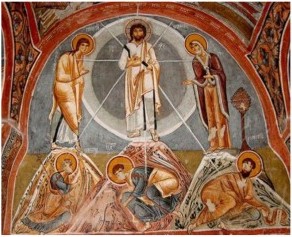0200 Messianism independent of Apocalypticism emerges. The Machabees avoid references to Messianism because they are not Davidic, but were usurpers. Messianism is intended to be restorative, directed inward, and in accord with natural laws. Sometimes theory has two Messiahs: a king and a priest, Moses and Aaron. Apocalypticism is, on the other hand, utopian, eschatological, directed outward, supernatural, not necessarily Messianic; the Messiah would gather the banished Is 11:12.

Participatory Messianism
0198 Antiochus III (Seleucid) takes Jerusalem after a siege, then allows the Jews to remain largely self-governing. Ethics are to be governed by ancestral laws; Jewish elites align with the foreign occupiers (again).
0189 The Seleucids are defeated by Rome at Magnesia. Yet another foreign invader is at the door.
0187-0175 Seleucus IV succeeds Antiochus, and loots the Jerusalem temple to pay reparations to Rome. Good relations with the Jewish aristocracy are harmed. Hellenization is widespread among the upper classes, as indicated by the prevalence of Greek names. Religious and social conservatives conflict with Hellenizers.
0186 In order to unite his ruled territories, Antiochus III imposes paganism on the Jews.
0180 Joshuah Ben Sirach cites the Torah and Prophets as the Jewish canon to which, once definitively established, no new works can be added.
0176 The Heliodorus Affair - High Priest Onius III is accused by a certain Simon of under-reporting tax income to the Seleucids; Heliodorus is sent by Antiochus III to Jerusalem and conducts an audit; Onius III goes to the Seleucid capital of Antioch to make his case; Antiochus III is assassinated; Antiochus IV takes over.
0175 Antiochus IV Epiphanes. The position of Jewish High Priest is bought by a certain Jason, who then Hellenizes Jerusalem and renames the city Antioch in honor of Antiochus IV.
0172 High Priest Jason is replaced by Menelaus, a far more radical Hellenizer, who seeks to bring Jews into the mainstream of Greek social and political life.
0168 Antiochus invades Egypt to achieve his dream of a united Hellenist East. At the gates of Alexandria he is ordered to withdraw by the Roman ambassador, Gaius Popillius Laenas. Antiochus says he must think about it, upon which Laenas draws a line in the sand around Antiochus and replies, “You’ll think about it here!” Antiochus withdraws and rumors are spread that he has died. Conservatives in Jerusalem depose Menelaus and undo the Hellenizing reforms. Antiochus isn’t dead, suppresses the revolt brutally, brings a Greek garrison into Jerusalem, introduces pagan rites into the Temple, and outlaws Jewish customs. Jewish martyrs arise: Mattathias (Hasmonean) refuses to worship the Greek gods, and sparks a revolt in Jerusalem. His son, Judah Machabee (the Hammer) leads a guerrilla war against the Seleucids.
~~~~~~~~

